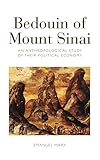Bedouin of Mount Sinai : An Anthropological Study of their Political Economy / Emanuel Marx.
Material type: TextPublisher: New York ; Oxford : Berghahn Books, [2013]Copyright date: ©2013Description: 1 online resource (208 p.)Content type:
TextPublisher: New York ; Oxford : Berghahn Books, [2013]Copyright date: ©2013Description: 1 online resource (208 p.)Content type: - 9780857459312
- 9780857459329
- 305.892720531
- DS113.75 .M37 2013
- online - DeGruyter
| Item type | Current library | Call number | URL | Status | Notes | Barcode | |
|---|---|---|---|---|---|---|---|
 eBook
eBook
|
Biblioteca "Angelicum" Pont. Univ. S.Tommaso d'Aquino Nuvola online | online - DeGruyter (Browse shelf(Opens below)) | Online access | Not for loan (Accesso limitato) | Accesso per gli utenti autorizzati / Access for authorized users | (dgr)9780857459329 |
Browsing Biblioteca "Angelicum" Pont. Univ. S.Tommaso d'Aquino shelves, Shelving location: Nuvola online Close shelf browser (Hides shelf browser)

|

|

|

|

|

|

|
||
| online - DeGruyter Foodways and Empathy : Relatedness in a Ramu River Society, Papua New Guinea / | online - DeGruyter Trieglaff : Balancing Church and Politics in a Pomeranian World, 1807-1948 / | online - DeGruyter The Gaddi Beyond Pastoralism : Making Place in the Indian Himalayas / | online - DeGruyter Bedouin of Mount Sinai : An Anthropological Study of their Political Economy / | online - DeGruyter Slavery and Antislavery in Spain's Atlantic Empire / | online - DeGruyter Astonishment and Evocation : The Spell of Culture in Art and Anthropology / | online - DeGruyter Family Upheaval : Generation, Mobility and Relatedness among Pakistani Migrants in Denmark / |
Frontmatter -- Contents -- Illustrations -- Acknowledgments -- Introduction -- Chapter One The Growth of a Conception Nomads and Cities -- Chapter Two The Political Economy of Bedouin Societies -- Chapter Three Oases in the Desert -- Chapter Four Labor Migrants Balancing Income and Social Security -- Chapter Five Smuggling Drugs -- Chapter Six Roving Traders Are the Bedouin’s Lifeline -- Chapter Seven Personal and Tribal Pilgrimages Imagining an Orderly Social World -- Conclusion -- References -- Index
restricted access online access with authorization star
http://purl.org/coar/access_right/c_16ec
The Sinai Peninsula links Asia and Africa and for millennia has been crossed by imperial armies from both the east and the west. Thus, its Bedouin inhabitants are by necessity involved in world affairs and maintain a complex, almost urban, economy. They make their home in arid mountains that provide limited pastures and lack arable soils and must derive much of their income from migrant labor and trade. Still, every household maintains, at considerable expense, a small orchard and a minute flock of goats and sheep. The orchards and flocks sustain them in times of need and become the core of a mutual assurance system. It is for this social security that Bedouin live in and retire to the mountains. Based on fieldwork over ten years, this book builds on the central theoretical understanding that the complex political economy of the Mount Sinai Bedouin is integrated into urban society and part of the modern global world.
Mode of access: Internet via World Wide Web.
In English.
Description based on online resource; title from PDF title page (publisher's Web site, viewed 25. Jun 2024)


